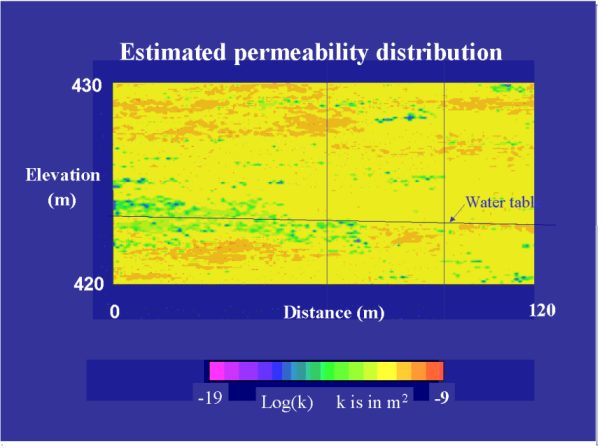
Panel 2 of 4
Estimating Multiphase Hydraulic Properties at a Crude-Oil Spill Site
William Herkelrath, Hedeff Essaid, and Leslie Dillard
U.S. Geological Survey, Water Resources Division, Menlo Park, California
ESTIMATING PERMEABILITY FROM PARTICLE-SIZE ANALYSIS:
The aquifer material at the Bemidji site is glacial outwash sand with some silt. The measured particle-size analyses are well represented by a lognormal distribution function. The formula of Krumbein and Monk (1942) was found to give a good estimate of permeability:
K (in m2) = (7.5 x 10-10) G2 e-1.31s.
G is the geometric mean particle size in mm, and s is the standard deviation of Krumbeinís f lognormal distribution function. The database of estimated permeability values was used to create a model aquifer for use in computer simulations. Geostatistical methods were used to extrapolate between points in order to estimate permeability on a uniform grid. A two-dimensional slice of the permeability distribution along the main transect of the oil pool is shown below.

ESTIMATING AIR-WATER CAPILLARY PRESSURE CURVES:
For each core sample, the method of Arya and Paris (1981) was used to estimate the air-water capillary pressure curve from the measured particle size distributions and the porosity. The estimated relationship between capillary pressure and water saturation, Sw, was fitted to a Van Genuchten (1980) function,
Sw = [1 + (aP)n]-m,
yielding a value of a and n for each core (m=1-1/n). The residual water saturation was assumed to be zero.
In order to estimate the parameters on the regular grid of the model aquifer, an approach based on Miller-Miller (1956) scaling was used. Given the estimated value of permeability at each grid point, corresponding values of a and n were calculated using the similar-media scaling law:
a
= (k / ka)1/2 aa and n=nawhere ka, aa, and na are the average values for all the cores.
For comments and questions about this web page, email the Minnesota
Webserver Team at: bemidji@maildmnspl.cr.usgs.gov
bemidji@maildmnspl.cr.usgs.gov